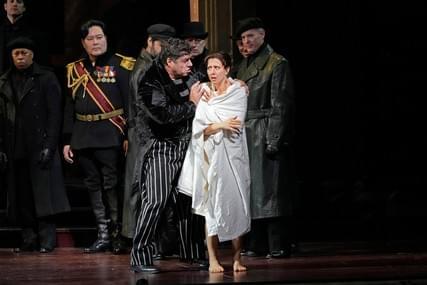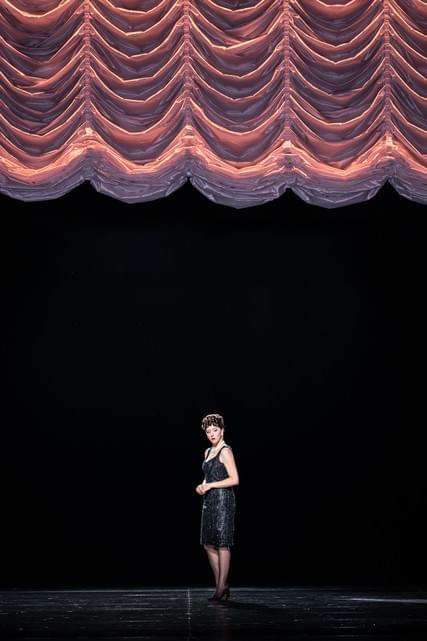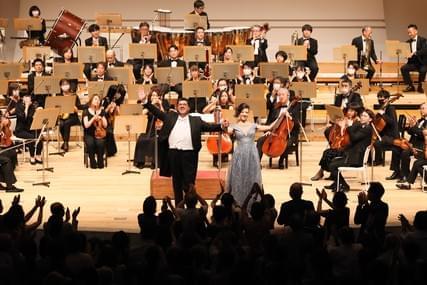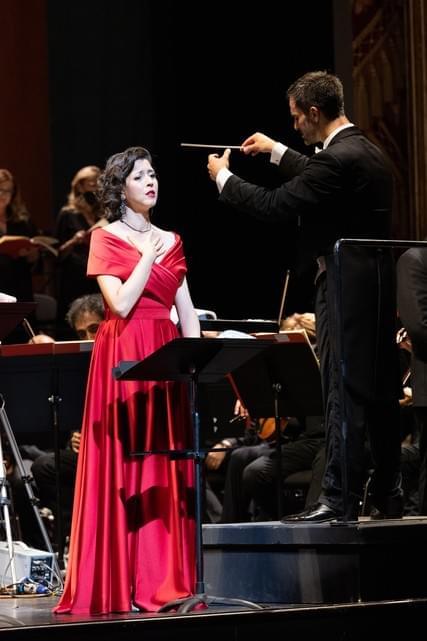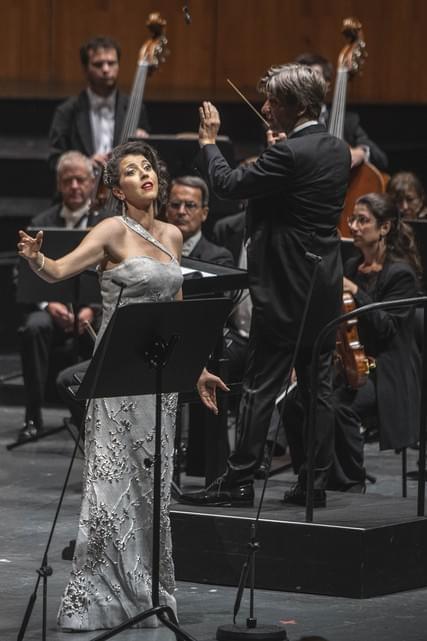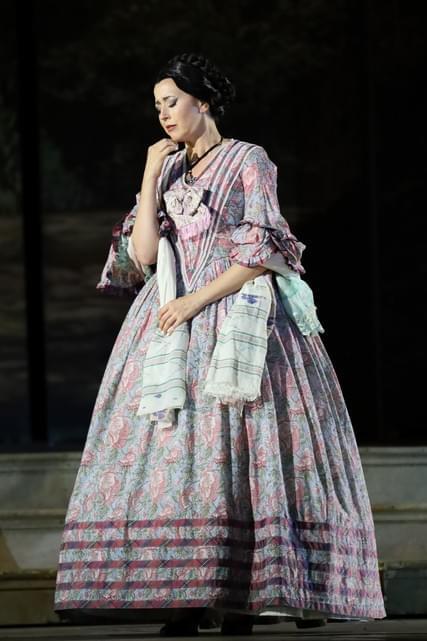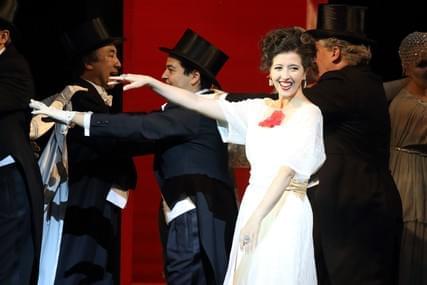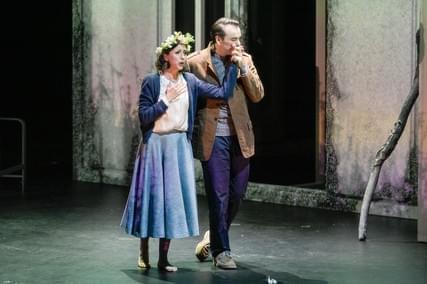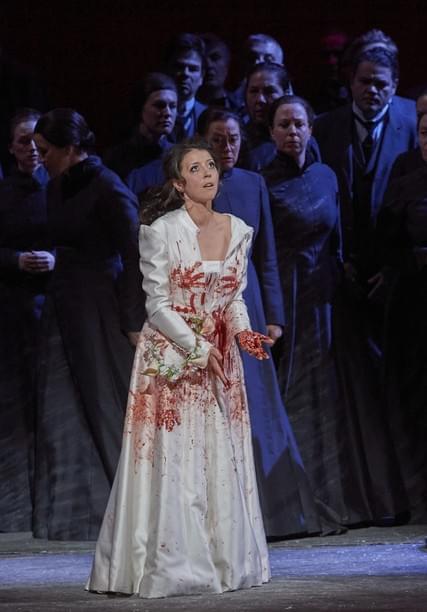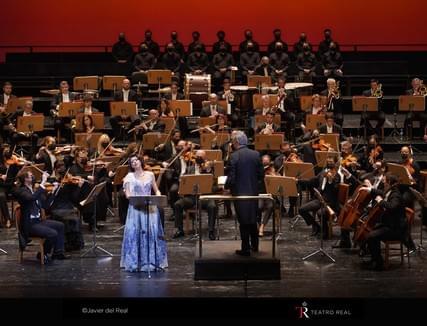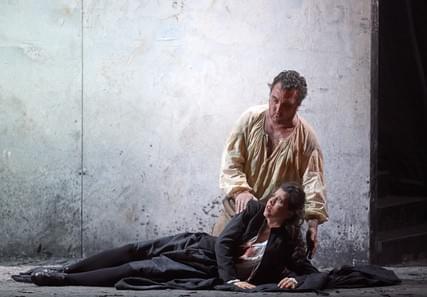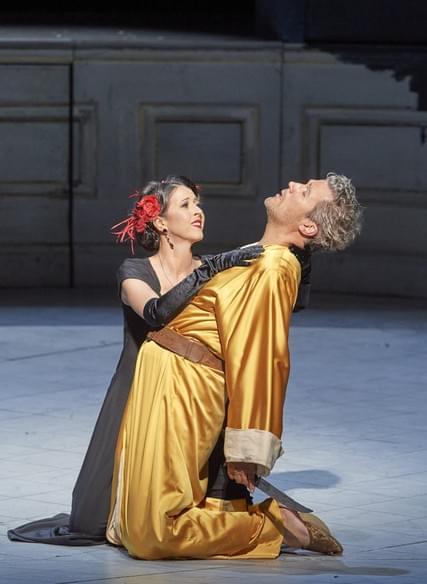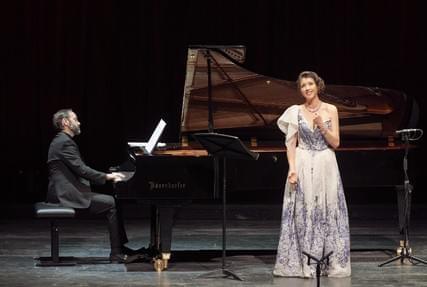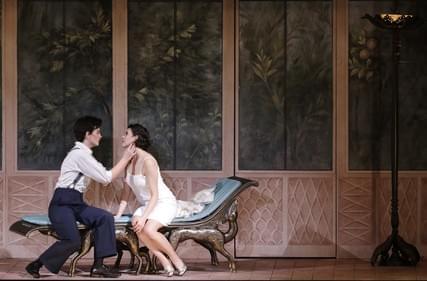2022
Metropolitan Opera - Rigoletto
Nov, 2022 - Dec, 2022RIGOLETTO ~ A Matinee at The Met
And her vocalism was ravishing. Strong emotional currents run thru everything Lisette sings; she can find just the right colour for every note and word, and it all seems perfectly spontaneous. A magical, palpable hush settled over the House during Lisette's "Caro nome": an exquisite portrait of a young girl on the brink, the innocence of the words underscored by a subtle sense of longing. In the ensuing scenes, phrase after phrase of captivating tone and nuance - from her defiance in the vendetta duet to the heart-wrenching poignancy of her farewell to her father - showed again what a thoughtful and unique artist this soprano is.None— Oberon • Oberon's GroveRoyal Opera House - Alcina
Sep, 2022 - Nov, 2022Lisette Oropesa brings star power to Alcina at the Royal Opera House — review
American soprano Lisette Oropesa delivers the star quality here as Alcina, conjuring an insouciant sense of superiority for the glittering enchantress, and singing with a high-class, diamantine soprano that never loses its quality. The intensity of her later arias comes across at white heat.None— Richard Fairman • Financial TimesNBS Japan Performing Arts Foundation - Concert
Teatro di San Carlo - I Puritani
Aug, 2022 - Sep, 2022FRETTOLOSA E MONOTONA LA DIREZIONE D'ORCHESTRA DI SAGRIPANTI. OROPESA LA PIU APPLAUDITA ANDUAGA TUTT
Applaudita più di tutti è Lisette Oropesa, al debutto nel ruolo di Elvira: 'agilità sfoderata nei passaggi di bravura è ragguardevole, lo scintillio della voce non sacrifica l'eleganza della frase; è su que. sto terreno esclusivo che il soprano americano costruisce la performance, lasciando a cimenti futuri la possibilità di caratterizzare a fondo un personaggio che pure, nei tre atti, cambia pelle più volte.The most applauded of all is Lisette Oropesa, debuting in the role of Elvira: the agility she displays in the bravura passages is remarkable, the sparkle of her voice does not sacrifice the elegance of the phrase; it's on this exclusive territory that the American soprano builds her performance, leaving to future endeavours the possibility to deeply characterize a character who, over the course of three acts, changes skin several times.— Stefano Valanzuolo • Il Mattino NapoliSalzburger Festspiele - Lucia di Lammermoor
Aug, 2022LUCIA AN DER SALZACH
In Salzburg kommt Lisette Oropesa den Idealvorstellungen des Komponisten irritierend nahe. Ihren aparten Sopran-Charme weiß die Amerikanerin expressiv zu entfalten. Auch, aber nicht nur in hoher und höchster Lage, wo das Publikum Sängerinnen immer so gerne abheben hört. Selbst dort, wo im Gesangstext destruktive Gefühle überborden, setzt Lisette Oropesa ihr Instrument nie forciert unter Druck.In Salzburg, Lisette Oropesa comes intriguingly close to the ideal image of the composer. The American knows how to expressively unfold her distinct soprano charm. Not just but especially in high and highest positions, where audiences always love hearing singers reach. Even in song texts where destructive feelings are overflowing, Lisette Oropesa never forcefully puts pressure on her instrument.— Volkmar Fischer • BR KlassikArena di Verona - Carmina Burana
Aug, 2022Arena bagnata e fortunata
All’altezza è stato il trio dei solisti ingaggiati per questa serata speciale. Lisette Oropesa è apparsa in un abito svolazzante azzurro pastello, perfetto per mettere in risalto la sua bellezza e la femminilità e soprattutto il suo atteggiamento sempre elegante, e ha sfoggiato la voce che conosciamo già e non ci stancheremo mai di ascoltare: un soprano cristallino e pulitissimo, ma pur sempre morbido. Fresca del grande successo nella Traviata, si è dimostrata una musicista raffinata e versatile capace di passare in modo naturale da uno stile all’altro, dalla musica lirica italiana della metà dell’Ottocento a quella tedesca di novant’anni dopo, dalla scrittura completamente diversa e a tratti impervia.The trio of soloists hired for this special evening certainly lived up to the occasion. Lisette Oropesa appeared in a billowy pastel blue dress, perfect to highlight her beauty and femininity, and above all her always elegant demeanor. She showcased the voice we already know and never tire of listening to: a crystal clear, immaculate soprano, yet always soft. Fresh from her great success in Traviata, she proved herself to be a refined and versatile musician capable of seamlessly switching from one style to another, from the Italian lyrical music of the mid-nineteenth century to the German music of ninety years later, with its completely different, at times challenging, composition.— Irina Sorokina • L'ape musicaleArena di Verona - La traviata
Aug, 2022“DOLCE NOTTE! QUANTE STELLE!”: TURANDOT, AIDA E TRAVIATA IN ARENA
Chi rivela una crescita artistica e interpretativa formidabile è Lisette Oropesa nei panni della protagonista. Quando sentimmo per la prima volta il soprano in questo ruolo avevamo previsto un ulteriore sviluppo e ne abbiamo la prova: la sua Violetta ora è completa, dal virtuosismo del I atto al liricismo del II, fino al canto drammatico del III. L’interprete è anche cresciuta sotto il punto di vista attoriale, gestendo benissimo anche la maturazione scenica di questo iconico personaggio.Lisette Oropesa, in the role of the protagonist, showcases an incredible artistic and interpretive growth. When we first heard the soprano in this role, we predicted further development, and now have proof: her Violetta is now complete, from the virtuosity of Act I to the lyricism of Act II, concluding with the dramatic singing of Act III. The artist has also grown in her acting abilities, superbly handling the stage development of this iconic character.— Francesco Lodola • Ieri Oggi Domaini OperaBayerische Staatsoper - La traviata
Jun, 2022 - Jul, 2022Lisette Oropesa inspires as Violetta at the Munich Opera Festival in Verdi's "La Traviata".
Lisette Oropesa, born in New Orleans in 1983, is an absolutely wonderful singer, as you can see at the Munich Opera Festival. There she sings Violetta in Verdi's "La Traviata" in Günter Krämer's production, which is now almost 30 years old. One of the bizarre things about opera is that dying on stage is often the most enchanting moment, and the way Oropesa sings and plays Violetta's dying here is extraordinarily moving. Because she is extraordinarily precise, never does too much, never too little, gives her voice that crucial fragility that makes a truly authentic impression. Ah, that voice. In the first act she glistens and shines. She is light as a feather, but Oropesa has, firstly, a brilliant technique and, secondly, a wonderful little vibrato that carries her voice over everything, always letting it shine out, while always having a warm, incredibly likeable basic sound. Oropesa is here, at the festival in the first act, highly elegant, dainty, enchanting, charming center of the hustle and bustle that has become somewhat worn out over the years of the production.None— Egbert Tholl • Süddeutsche ZeitungOpernhaus Zürich - Lucia di Lammermoor
May, 2022 - Jun, 2022ZURICH/ Opera House: LUCIA DI LAMMERMOOR. resumption. A strong plea for concert performances
Lisette Oropesa is Lucia, his sister. With a slender stature and southern appearance, she develops a noticeable stage presence from the very first moment and fascinates with her natural play. Her youthfully fresh soprano is absolutely confident in the high notes and skilled in coloratura, leaving nothing to be desired.None— Jan Krobot • Online MerkerWiener Staatsoper - Lucia di Lammermoor
Apr, 2022VIENNA / State Opera: LUCIA DI LAMMERMOOR
After her brilliant performance as Konstanze in Hans Neuenfels ' Abduction and her solo concerto, Lisette Oropesa's role debut as Lucia was eagerly awaited. A complete success. Like the Cuban-American at the beginning of “ …Ed ecco! ecco su quel margine…' startled by the ghostly appearance of the dead woman, already indicates how sensitive, filigree and highly endangered the young woman she portrays is. Her oath of love is highly credible, and the mad scene is touchingly dramatic. 20 gripping, varied minutes that are incredibly touching. Oropesa has been the most sought-after Lucia since her role debut in 2017 at the Royal Opera House London. The acting is unsurpassed and the singing is almost perfect. The coloraturas are supple and clear, her silvery-bright, modulation-capable soprano voice is paired with a secure technique and strong charisma.None— Manfred A. Schmid • Online MerkerGran Theatre del Liceu - 175th Anniversary Concert
Mar, 2022 - Apr, 2022Gala Liceu
La Lucia di Lisette Oropesa resta nella memoria come un momento sospeso nel tempo, con le sue cadenze perfette, acuti torniti, puntature cinguettate.Lisette Oropesa's portrayal of Lucia remains in memory as a moment suspended in time, with her perfect cadences, sculpted high notes, and chirping staccatos.— Valentina Anzani • Giornale della MusicaTeatro Real - Concert
Mar, 2022Lisette Oropesa triunfa en su esperado regreso al Teatro Real
De su ópera Les Martyrs estrenada en Paris en 1840, probablemente de sus menos conocidas o representadas, Oropesa interpretaba un aria oscura “O ma mère, ma mère...Qu'ici ta main glacée bénisse ton enfant”, de un belcantismo al límite, a la vez que apropiado para exhibir unas dotes registros agudos y extraordinaria agilidad que requieren no solo técnica o eficacia, sino una suerte de don. Eso sí, intensamente trabajado.From his opera Les Martyrs, premiered in Paris in 1840, probably among his least known or performed works, Oropesa was interpreting a somber aria, “O ma mère, ma mère...Qu'ici ta main glacée bénisse ton enfant", exhibiting bel canto at its extreme, while also suitable for showcasing high register skills and extraordinary agility that require not just technique or proficiency, but a sort of gift. That said, intensely honed.— Alicia Huerta • RepublicaWiener Staatsoper - Rigoletto
Mar, 2022WIEN/ Staatsoper: RIGOLETTO – wieder umbesetzt
Oropesas Sopran ließ Gilda keine kühle Virtuosität angedeihen, sondern trug das Herz auf der Zunge. Ihre Stimme ließ in der weich gebetteten Mittellage eine leise Wehmut anklingen, die an längst vergangene Opernzeiten erinnerte. Die Sängerin spielte die Figur ohne Übertreibung, erfüllte sie mit herzwärmender Naivität und JugendlichkeitOropesas's soprano did not bestow upon Gilda a cold virtuosity, but wore her heart on her sleeve. Her voice hinted at a gentle melancholy in the softly cushioned middle register, reminiscent of long past opera times. The singer portrayed the character without exaggeration, imbuing her with heartwarming naivety and youthfulness.— Dominik Troger • Online MerkerWiener Staatsoper - Die Entführung aus dem Serail
Mar, 2022Triumph den Haremsmäusen
Den meisten Applaus erntete Lisette Oropesa für ihre alle Herausforderungen meisternde KonstanzeLisette Oropesa garnered the most applause for her Konstanze, mastering all challenges.— Marion Eigl • Wiener ZeitungWiener Staatsoper - Recital
Mar, 2022WIEN / Staatsoper: Solistenkonzert LISETTE OROPESA
Oropesa gelingt es, mit ihrem schlanken, flexiblen Sopran die in den von ihr ausgewählten Liedern beschworenen Stimmungen und Bilder einfühlsam auszuloten.Oropesa succeeds in sensitively exploring the moods and images evoked in the songs she has selected with her slim, flexible soprano.— Manfred A. Schmid • Online MerkerLes Arts - Recital
Mar, 2022De Mercadante a Lecuona, la exquisita Lisette Oropesa encandila en el Reina Sofía
El programa, amplio en ese abanico, fue además extraordinariamente generoso, tanto como la cercanía de la cantante. Oropesa no lo puede evitar. Es simpática y extrovertida, y necesita el contacto constante con el público. No importa si canta o no. Ella es pura comunicación permanente. Y generoso y grande también es su nivel interpretativo, ya que la soprano es dueña de un instrumento, y de unos conocimientos, propios de los mejores. Y por eso es un privilegio escucharla; porque cante lo que cante, lo hace con sabiduría, e imprimiendo un estilo que recuerda a épocas donde deslumbraron los grandes como De los Ángeles o Callas.The program, extensive in its variety, was additionally extraordinarily generous, as much as the singer's approachability. Oropesa can't help it. She is friendly and outgoing and needs constant contact with the audience. It doesn't matter if she sings or not. She is pure continuous communication. And generous and grand is also her interpretative level, since the soprano possesses an instrument and knowledge characteristic of the best. And that's why listening to her is a privilege; because whatever she sings, she does it with wisdom, and imprinting a style that reminds one of eras where greats like De los Ángeles or Callas dazzled.— Jacobo Ríos-Capapé Carpi • Valencia PlazaTeatro alla Scala - I Capuleti e i Montecchi
Dec, 2021 - Feb, 2022Oropesa y Scappucci, estrellas del Shakespeare belcantista milanés
Fue tarea relativamente fácil con la soberbia Giulietta de Lisette Oropesa, que cautivó con sus habilidades: además de cantar con holgura una parte llena de riesgos virtuosísimos, con subidas repentinas al extremo agudo, posee una línea de canto ejemplar en emisión, legato y facilidad para doblar el instrumento, al cual un ligero vibrato añade un toque suplementario de originalidad y carácter, con medias voces, y utilizando una generosa y amplia paleta de colores. Encima tiene la juventud y frescura indispensables para brindar también la estética al personaje, el que sale airoso en toda su fuerza teatral y dramática.It was a relatively easy task with the superb Giulietta by Lisette Oropesa, who captivated with her skills: in addition to singing comfortably a part filled with virtuosic risks, with sudden climbs to the extreme high notes, she possesses an exemplary singing line in emission, legato, and ease of bending the instrument, to which a slight vibrato adds an additional touch of originality and character, with half voices, and using a generous and broad palette of colors. Moreover, she has the youth and freshness indispensable to also bring aesthetics to the character, who emerges victorious in all its theatrical and dramatic strength.— Andrea Merli • Opera Actual

